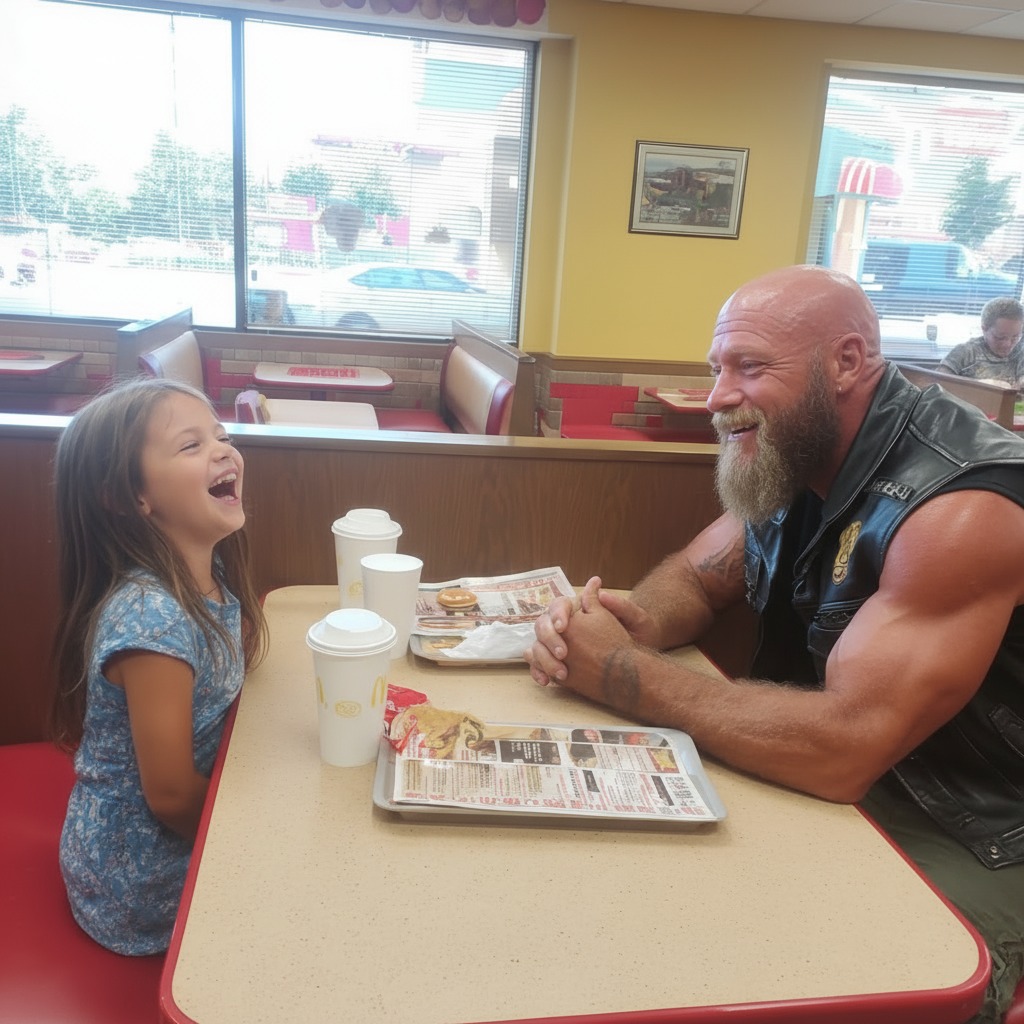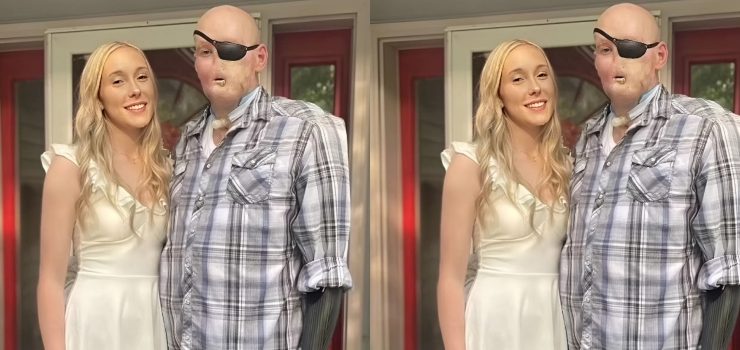Every Saturday, a massive biker covered in tattoos and scars would walk into a McDonald’s and order two Happy Meals, sitting in the same corner booth like clockwork. At exactly noon, a little girl would arrive, no more than seven years old, and she would run into his arms, calling him “Uncle Bear.”

To other customers, the scene looked suspicious, even dangerous. The sight of a skull-tattooed man in leather embracing a small child stirred fear, and complaints poured into the manager about this “inappropriate” friendship. After six months of it, the manager called the police. Three officers showed up expecting to stop what many assumed was a predator grooming a child, but what they discovered left the restaurant silent. When the little girl, Lily, spotted the officers, she froze and clung to Bear’s arm, her voice trembling as she asked if they were taking him away like they had taken her daddy.
Bear, a six-foot-four Marine veteran who had served three tours in Afghanistan and spent years with the Nomad Warriors MC, placed a gentle hand on her head and told her they hadn’t done anything wrong, though his eyes were already scanning exits. The lead officer approached carefully, explaining they had received complaints, and Bear calmly pulled out a laminated court document to show his rights. What the officers read changed everything.
Bear wasn’t Lily’s blood relative, but he had served beside her father in Afghanistan. They had saved each other’s lives more than once, and when Lily’s father spiraled after traumatic brain injury and severe PTSD, Bear promised to look after his daughter. Lily’s dad had robbed a bank with an unloaded weapon, essentially asking to be caught, and was now serving fifteen years in federal prison. Before he went away, he begged Bear to make sure his little girl knew she was loved, that she never believed he had abandoned her. Her mother had moved on, remarried, and distanced herself from the military community, but the courts granted Bear visitation: two hours every Saturday in a neutral public place. McDonald’s was the compromise, and Bear never missed a visit.
The officers listened as Bear explained how he told Lily stories about her father—heroic stories from before the war broke him—so she would remember him as a protector, not just a prisoner. He showed photos: combat missions, baby pictures, weddings, and even hospital scenes where he sat by her father’s side. Lily herself chimed in, proudly recalling how her dad said Uncle Bear cried when she was born and was the first to hold her. When the officer handed the papers back and thanked Bear for his service, Bear stood, towering over the restaurant, and delivered a speech that shook everyone watching.
He told them the real danger wasn’t a veteran eating lunch with a child but a society so blinded by appearances that it would call the police on a man keeping a promise to his fallen brother in arms. He pointed to the patches on his vest: a Purple Heart, a Bronze Star, unit insignia, and one small pink patch stitched by Lily that read “Best Uncle.” He said that patch meant more than all the medals combined. Customers who had judged him began to realize their mistake. An older veteran stood up to vouch for him, describing how Bear read to Lily, helped with homework, and showed her love every week.
Others admitted they had seen his kindness too, from tipping teenage workers to crying alone in his truck after drop-offs. The officers turned their attention to the manager, telling him to stop judging people by looks. Though the manager apologized, Bear was furious that Lily’s private pain had been exposed in public, and he held her close as she tried not to cry. “They’re scared of you?” she asked him softly. “But you’re not scary. You’re safe.” The following Saturday, Bear expected fallout, maybe canceled visits, maybe more suspicion. Instead, he walked into a standing ovation. Veterans from across town filled the restaurant, many on bikes, many wearing their own patches, there to show solidarity. Instead of suspicious stares, Lily was greeted with smiles, gifts, and respect. Even one of Bear’s harshest critics approached him in tears, admitting her own son had come home from Iraq broken, and she had pushed him away out of fear until he overdosed alone. She told Bear that seeing him with Lily reminded her of the son she lost.
Lily hugged her and said simply that heroes sometimes forget they are heroes but still deserve love. Bear’s phone buzzed with a message from Lily’s father, sent through prison email, thanking him for keeping his promise and reminding him that in seven years, he would be home to help carry the weight. Bear showed Lily the message, and she smiled as she traced the words, “Love you both.” From that day forward, Bear and Lily weren’t met with suspicion but with support. Veterans came to their booth to chat, the manager personally brought their food, and the teenage cashier who once doubted him now drew pictures for Lily. Every Saturday, Bear told her another story of her father’s bravery, reminding her that love and loyalty run deeper than mistakes.
When Lily asked if her father would be different when he came home, Bear told her prison might change him, but his love for her would never fade. She asked if he’d always keep his promise to protect her, and he linked his massive pinky with hers, swearing he always would. To the world, he looked like a dangerous outlaw, but to Lily he was her protector, her family, and her reminder that promises matter more than appearances. And so they continued, every Saturday at that corner booth, sharing Happy Meals, telling stories, and proving that love, loyalty, and brotherhood can break through fear and prejudice.





